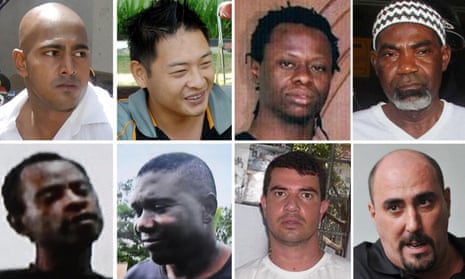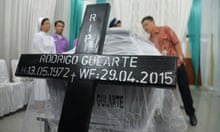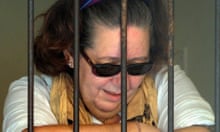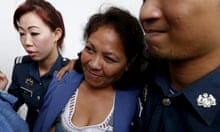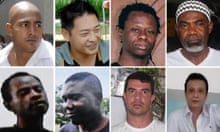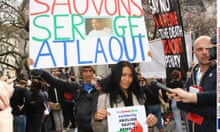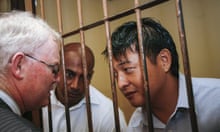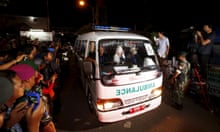The Indonesian government has executed by firing squad eight people for drug offences, including two Australians, Andrew Chan and Myuran Sukumuran, who were the subject of a years-long campaign for clemency.
The development marks the end of years of campaigning to spare the men, who were sentenced to death in 2006 for their part in the Bali Nine heroin-smuggling ring.
Also executed were four Nigerians, a Brazilian and an Indonesian. All had been convicted of drug crimes.
A ninth prisoner scheduled to face the firing squad, Filipino woman Mary Jane Veloso, received a last-minute temporary reprieve.

Veloso, who was arrested in Yogyakarta in 2010 with 2.6kg of heroin in her suitcase, was granted a stay of execution after the woman she claims set her up “voluntarily surrendered” to police on Tuesday.
A spokesman for the Indonesian attorney general, Muhammad Prasetyo, said Veloso’s death sentence had been postponed so she could testify against the woman, Maria Kristina Sergio.
The killings were carried out at 12.30am, local time, on the prison island of Nusa Kambangan off the coast of Java.
Chan’s brother, Michael, said after the execution he had “just lost a courageous brother to a flawed Indonesian legal system”. “I miss you already RIP my Little Brother,” he tweeted.
I have just lost a Courageous brother to a flawed Indonesian legal system. I miss you already RIP my Little Brother
— Michael chan (@Changa5378) April 28, 2015
The Australian pair’s Indonesian lawyer, Todung Mulya Lubis, also expressed sorrow on Twitter, writing, “I am sorry” and “I failed. I lost”.
Hundreds had gathered at the port of Cilacap on Tuesday to watch lawyers and families make their final visits to the prisoners.
Police were forced to use dogs to clear the heavy media pack when Chan’s and Sukumaran’s visibly distressed relatives arrived. Sukumaran’s sister, Brintha, collapsed in the melee and had to be carried into the port office by her father, Sam.
Speaking after their visit, Sukumaran’s brother, Chinthu, again urged Indonesia to show mercy. “Please don’t let my mum and my sister have to bury my brother,” he said. Through tears, his mother, Raji, said: “I won’t see my son again and they are going to take him tonight and shoot him and he is healthy and he is beautiful and he has a lot of compassion for other people.
“Please president, please don’t kill him today. Please don’t. Call off the execution. Please don’t kill my son. Please don’t.”
Michael Chan said the family had gone through “torture”. “I saw today something that no other family should ever have to go to. Nine families inside a prison saying goodbye to their loved ones,” he said. “There has to be a moratorium on the death penalty, no family should endure it. Because now the family is going to have a grieving process for the rest of their life.”
Angela Muxfeldt, cousin of the Brazilian, Rodrigo Gularte, said in the hours before his execution the 42-year-old was the calmest she had seen him in three months. “He is calm. He doesn’t want I cry and doesn’t believe execution will happen,” she said, visibly emotional.
Lawyers for Gularte were still lodging an appeal on Tuesday, claiming he suffered from schizophrenia and bipolar disorder and had been unfit to stand trial when sentenced to death for cocaine smuggling in 2005.
Chan and Sukumaran, too, have outstanding legal challenges, including a constitutional appeal on 12 May to a presidential decision in January to deny them clemency, reportedly made without having even reviewed their files.
The others who were executed were Raheem Agbaje Salami (also known as Jamiu Owolabi Abashin), Silvester Obiekwe Nwolise, Martin Anderson, Zainal Abidin and Okwuduli Oyatanze.
A 10th death row prisoner, Serge Atlaioui, from France, was due to be executed this week, but his sentence has been delayed pending a legal challenge.
Veloso’s last-minute stay of execution was granted after Sergio, who was wanted for human trafficking and illegal recruitment in relation to the case, handed herself in to police in the Philippines province of Nueva Ecija on Tuesday morning.
Veloso claims that Sergio enticed her to Malaysia with a job offer, where an associate known as Ike bought her a new suitcase and instructed her to run an “errand” to Indonesia, where police found the heroin stitched into the lining of her bag. Sergio has denied this account.
Tony Spontana, a spokesman for the Indonesian attorney general, Muhammad Prasetyo, said in a text message: “There was a request from the Philippine president regarding the perpetrator who’s suspected of committing human trafficking and surrendered in the Philippines. MJ [Mary-Jane] is needed for her testimony.”
The remaining eight prisoners were tied to wooden stakes and shot by 12 marksmen, three of whom carried live rounds. They aimed at crosses marked over the mens’ hearts.
Months of high-level diplomatic representations and high-profile campaigns failed to sway the Indonesian president, Joko Widodo, who has described narcotics as a “national emergency” and pledged to clear the country’s death row of drug offenders.
Six people, five of them foreigners, were shot in a first round of executions in January. Official figures are unreliable, but following these most recent killings, it is estimated around 33 foreigners remain on death row in Indonesia for drug crimes.
Speaking hours before the executions, Australia’s foreign minister, Julie Bishop, said she was “deeply disturbed” by Indonesia’s handling of the matter and warned there “will have to be consequences”.
Australia has never withdrawn diplomatic staff over an execution of a citizen abroad, but on Tuesday evening the prime minster, Tony Abbott, said he was recalling Australia’s ambassador to Indonesia, Paul Grigson. Abbott said Australia’s reaction could not be “simply business as usual”. “For that reason … our ambassador will be withdrawn for consultations,” he said.
The human rights lawyer Geoffrey Robertson QC called on Tuesday for some of the $600m that Australia directs to Indonesia each year in foreign aid to be redirected to Nepal.
Brazil and the Netherlands withdrew their ambassadors following the January round of executions, which included their citizens, and Brazil has refused to accept the credentials of the new Indonesian ambassador.
Plans for Wednesday’s executions attracted international condemnation, including from the UN secretary general, Ban Ki-moon, who called on Widodo to “urgently consider declaring a moratorium on capital punishment in Indonesia, with a view toward abolition”.
The Council of Europe secretary general, Thorbjørn Jagland, had also asked Indonesia to refrain, calling the death penalty “a terrible injustice which can never be put right”.
On Tuesday, Australia, the European Union and France issued a joint statement asking Indonesia to “reflect on the impact [of the executions] on Indonesia’s position in a globalised world and an international reputation”.
“We support Indonesia’s efforts to obtain forgiveness for its citizens abroad. Stopping this execution will help those efforts,” the statement said.
Vigils were held across Australia for Chan, 31, and Sukumuran, 34, whose cause had been embraced by the country in their final months. Tarred as thugs for years after their capture, on death row the pair underwent sincere transformations, Chan converting to Christianity and Sukumaran emerging as an accomplished artist.
After earlier denying the pair their choice of spiritual counsellors, Indonesian authorities relented late on Tuesday, allowing pastors Christie Buckingham and David Soper to attend to the men in the final hours.
Sukumaran continued to paint up until his last day, producing a rendering of a human heart signed by each nine of the prisoners who were scheduled to be shot in the early hours of Wednesday. It was titled, “One heart, one feeling in love”.
